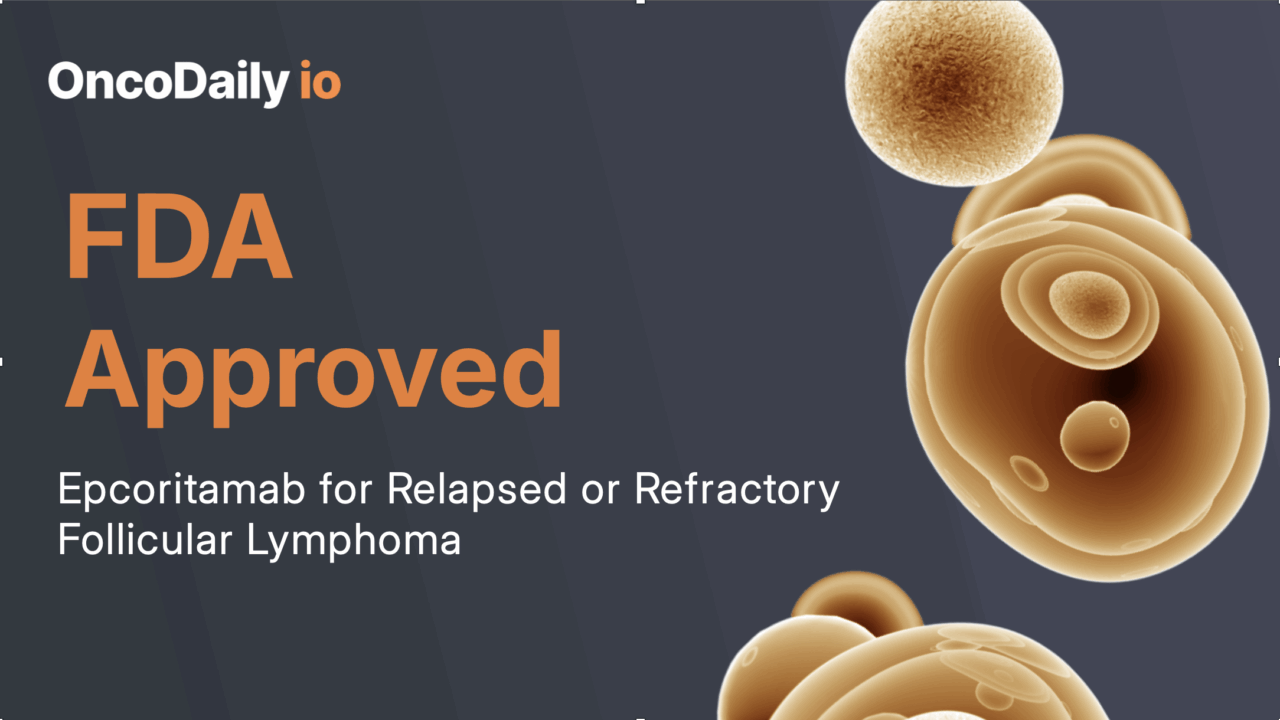Approval Date: November 18, 2025
The FDA has approved epcoritamab-bysp (Epkinly) for two therapeutic indications in follicular lymphoma:
- Combination Therapy: Approved for use with lenalidomide and rituximab (R2) in adults with relapsed or refractory follicular lymphoma (FL). This provides a new immunotherapy-based option earlier in the treatment course.
- Monotherapy: Granted traditional approval as a single agent for adults with relapsed or refractory FL who have received two or more prior lines of systemic therapy.
(This indication was initially granted accelerated approval in 2024.)
Epcoritamab-bysp is a subcutaneous CD3×CD20 bispecific antibody. It works by simultaneously engaging CD3 on T cells and CD20 on malignant B cells, activating the patient’s own immune system to selectively target and destroy lymphoma cells.
Efficacy in the EPCORE FL-1 Trial
The efficacy of epcoritamab-bysp was demonstrated in the large, randomized EPCORE FL-1 trial, which enrolled 488 patients with relapsed or refractory follicular lymphoma. Patients were assigned in a 1:1 ratio to receive either epcoritamab-bysp in combination with lenalidomide and rituximab (R2) or R2 alone. Although this was a relapsed population, most individuals had received only one prior line of therapy, representing an early-relapse group in need of improved options.
The addition of epcoritamab-bysp led to a profound improvement in progression-free survival. The hazard ratio for progression or death was 0.21, indicating a 79% relative reduction in risk compared with R2 alone. Importantly, the median progression-free survival had not yet been reached in the epcoritamab-containing arm at the time of analysis, whereas the control arm showed a median PFS of 11.2 months. This early separation of curves and substantial reduction in risk highlight the strong antitumor activity of the bispecific antibody when added to standard therapy.
Response rates were also significantly higher with epcoritamab-bysp. The overall response rate reached 89% in the combination arm, compared with 74% in patients treated with R2 alone. This improvement reflects deeper and more consistent disease control across the study population. Collectively, the data establish epcoritamab-bysp combined with R2 as a highly effective regimen for patients with relapsed or refractory follicular lymphoma, offering superior response and markedly prolonged disease control relative to existing therapy.
Safety
The prescribing information includes boxed warnings for:
- Cytokine Release Syndrome (CRS)
- ICANS (immune effector cell-associated neurotoxicity syndrome)
Key safety findings:
- Serious adverse reactions: 51%
- Serious infections: 28%
- CRS: 24% (12% were serious)
- ICANS: 0.8%
Cytopenias and infections were common and require close monitoring.
Recommended Regimen
The approved regimen for epcoritamab-bysp in combination with lenalidomide and rituximab follows a structured stepped-up dosing schedule to reduce the risk of cytokine release syndrome while allowing patients to reach the full therapeutic dose.
Treatment begins with a gradual escalation of subcutaneous epcoritamab-bysp during the first 28-day cycle. Patients receive 0.16 mg on Day 1, 0.8 mg on Day 8, 3 mg on Day 15, and then reach the target dose of 48 mg on Day 22. Once the step-up phase is completed, epcoritamab-bysp is administered at 48 mg weekly during Cycles 2 and 3, followed by 48 mg once every four weeks during Cycles 4 through 12.
In parallel, lenalidomide is taken orally on Days 1 through 21 of each 28-day cycle, and rituximab is administered during the first five cycles of therapy. Altogether, the combination regimen is designed to extend over twelve cycles, offering a comprehensive, immune-engaging treatment approach for patients with relapsed or refractory follicular lymphoma.


